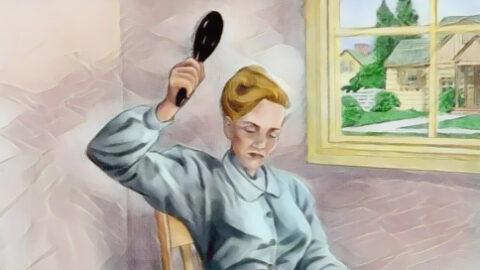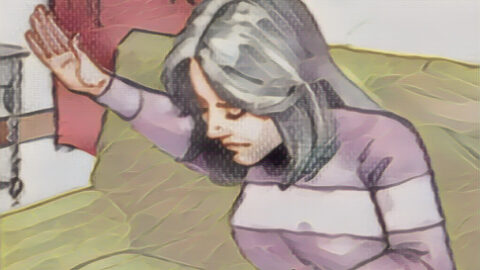(gap: 2s) In the gentle haze of my childhood, there was a girl named Katherine Smith, my most steadfast companion through the sunlit days of our early school years. Katherine was a diminutive, fair-skinned girl with a cascade of honey-blonde hair that always seemed to catch the afternoon light, and eyes of the brightest blue, brimming with both mischief and kindness. She was quick to smile, gentle in her manner, and endlessly patient—a natural peacemaker, ever ready to share her toys or offer a comforting word. Katherine’s family resided in a gracious, well-appointed house nestled in a leafy, prosperous neighbourhood—a world quite apart from my own. Her parents, both dignified and somewhat older than mine, exuded a calm, measured authority that seemed to permeate every corner of their home.
(short pause) I, Amanda, was a wiry, dark-haired girl with a determined chin and a restless energy that frequently led me into mischief. I was one of five spirited siblings, raised in a home where disorder reigned and affection was a rare, fleeting visitor. My parents, harried and often overwhelmed, could be severe—quick to anger, their discipline unpredictable and sometimes harsh. Yet, in truth, we were more neglected than truly mistreated, left to our own devices in a house that always seemed a little too loud, a little too cold.
(pause) It was the 1950s, a time when children roamed freely and the world felt both vast and intimate. I would often escape to Katherine’s house, drawn by the promise of order, warmth, and the gentle hum of a family that seemed to have mastered the art of kindness.
(short pause) One golden afternoon, Katherine and I found ourselves in her basement, a cosy, softly lit space filled with the scent of old books and the promise of adventure. We sat cross-legged on the carpet, surrounded by a rainbow of coloured pencils—those delightful implements that carried the faintest aroma of wood and possibility. I remember the way the sunlight filtered through the small window, casting patterns on the floor as we coloured, giggling over our masterpieces.
(pause) At some point, I picked up a pencil, sniffed it, and wrinkled my nose in mock distaste. “This one smells most disagreeable!” I declared, my voice ringing out in the stillness. The words hung in the air, innocent yet irreverent, and for a moment, Katherine and I dissolved into laughter.
(pause) But scarcely a minute had passed when the sound of footsteps echoed down the stairs. Katherine’s mother, Mrs Smith, appeared in the doorway—a vision of composure in her crisp blouse and neatly pressed skirt. Mrs Smith was a tall, elegant woman in her late forties, with silver-streaked chestnut hair always pulled back in a tidy chignon. Her eyes, a deep hazel, were both kind and unwavering, and her presence seemed to command respect without ever raising her voice. She moved with a quiet grace, her posture always impeccable, and her voice carried a gentle but unmistakable authority. “What did you say, young lady?” she inquired, her tone gentle but edged with unmistakable authority. I froze, the laughter dying on my lips. Without protest, I obeyed her quiet command to go upstairs and wait in Katherine’s bedroom, my heart pounding with a mixture of dread and shame.
(pause) The minutes ticked by with agonising slowness as I sat alone in the softly decorated room, surrounded by Katherine’s dolls and neatly made bed. The air was thick with anticipation, and I felt small, exposed, and terribly uncertain of what was to come.
(pause) At last, Mrs Smith entered, closing the door behind her with a gentle click. She sat beside me, her posture composed, her voice calm as she addressed me. “Amanda, I know you are a good girl, but you have used some very improper words. Good girls do not use such language.” Her words were not harsh, but they carried the weight of disappointment—a far more painful sting than any raised voice.
(pause) She continued, her gaze steady and kind. “You are very much a part of our family, Amanda, and so you shall be treated as Katherine would be in the same circumstances. That means I must chastise you, to teach you a lesson.” The word ‘chastise’ was unfamiliar to me, foreign and oddly formal. I flinched as she gently took my arm and guided me across her lap, her movements firm but never cruel.
(pause) The world seemed to shrink to the small, sunlit bedroom, the air heavy with expectation. My heart thudded in my chest as Mrs Smith settled me across her lap, her skirt cool and crisp beneath my cheek. I could smell her perfume—a soft, powdery scent that mingled with the faint aroma of laundry soap and the lingering sweetness of Katherine’s dolls. My hands trembled as I gripped the edge of the bedspread, the fabric rough beneath my fingers. (short pause) The first few slaps landed with a gentle pat, more startling than painful, the sound echoing in the quiet room. I squeezed my eyes shut, bracing myself, but the sensation was light, almost ceremonial. For a fleeting moment, I thought, “This is nothing—I can bear this.” (pause) But then Mrs Smith paused, her hand resting on my back, her touch both reassuring and impossibly heavy. In that same calm, unwavering voice, she repeated, “Good girls do not use such words, and you are a good girl.” There was a tenderness in her tone that made my chest ache, a longing to be worthy of her approval.
(pause) She resumed, her hand a little firmer now, and the sting blossomed across my person—sharp, sudden, and real. Each slap was measured, never cruel, but the heat built with every one, until tears pricked at my eyes. I bit my lip, trying to hold them back, but the ache inside me was more than just physical. It was the ache of shame, of regret, of wanting so desperately to belong. The chastisement seemed to stretch on forever, each moment suspended in a haze of emotion—embarrassment, guilt, and a strange, aching gratitude. I felt exposed, vulnerable, and yet, in some inexplicable way, safe. (short pause) The room was silent except for the soft, rhythmic sound of Mrs Smith’s hand and my own quiet sniffles. I could feel the warmth of her presence, the steadiness of her manner, and I knew, even as I wept, that I was not being punished out of anger, but out of love—a lesson wrapped in gentleness and care.
(pause) When it was done, Mrs Smith helped me to my feet and gathered me into her arms. She held me close, her embrace warm and reassuring. “You are my good girl again,” she whispered, her voice soft with forgiveness. There were no harsh words, no lingering anger—only the gentle certainty that I was loved, even in my imperfection.
(pause) In that moment, as she held me, I felt a sense of belonging and safety I had never known before. I wanted nothing more than to be her good girl, to bask in her approval and affection. She told me it was all over, and that I could return to Katherine and our colouring, as though nothing had happened.
(pause) The years passed, and when Katherine and I reached the third form, Mrs Smith accepted a position closer to the city. The family moved away, and with their departure, a light seemed to fade from my world. I was inconsolable, adrift in a childhood that never again felt quite as safe or as cherished.
(pause) There was one other occasion when Mrs Smith chastised me—this time with Katherine by my side. On a few other days, I found myself acting out, longing for her attention, though not necessarily another chastisement. More than anything, I yearned to be her ‘good girl’, to feel again that rare and precious sense of being truly seen and truly loved.
(long pause) Looking back, I realise that what I craved most was not discipline, but the gentle, unwavering love that Mrs Smith so effortlessly bestowed—a love that, for a brief, shining moment, made me believe I was worthy of kindness and care.
































